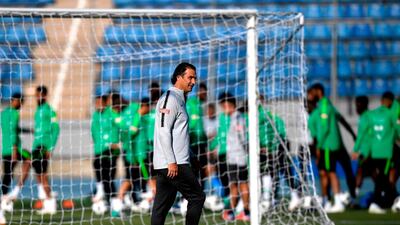Juan Antonio Pizzi was not the second manager after qualification had been sealed, but the third.
Bert van Marwijk had already gone back in September, despite securing for Saudi Arabia a first World Cup since 2006. By that time, the Dutchman had turned around a struggling squad, but a lingering problem regarding the amount of time spent in his adopted country was cited as the principal reason for a parting of the ways.
Whatever the cause, the effect was considerable. It was keenly felt.
Edgardo Bauza was selected to fill the void, the Argentine fetched from neighbours UAE in what always seemed a strange arrangement. The wrong man at the wrong time. If his tenure in the Emirates was brief – he was there four months – it was even shorter in the Kingdom.
Two months in, Bauza had been dismissed, an ill-advised appointment laid bare not long after it had begun. It was late November, nine days until Saudi would be confirmed to participate in the 2018 World Cup's opening match against hosts Russia, and they needed another man to helm that campaign.
So the Saudis plumped for Pizzi. His track record was favourable, if confined for the most part to Central and South America, an Argentine who as a player had represented Spain; a former striker born in Sante Fe who had masterminded Chile’s march to 2016 Copa America success in the United States.
Pizzi arrived at Saudi Arabia and, most importantly, seven months in, one day out from hosts Russia at the Luzhniki Stadium in Moscow, he has survived. What is more, he appears to have found his rhythm.

Pizzi looks to be growing comfortable in his latest professional skin, as a Saudi side, so wedded to both Van Marwijk and his football philosophy, have evidently become more at ease with their latest manager.
Last week, to mark his 50th birthday, Pizzi was presented with a cake following iftar during the squad’s final training camp. His players formed a guard of honour, and playfully pawed at him as he passed through. It was one week to the World Cup’s opening match. Pizzi’s plan has been seven months in the making.
The past five have been dominated by training camps and tactical sessions, by improving both his team’s fitness and focus. Five camps, in fact, taking the group from Saudi to Spain, to Switzerland. Lately there have been friendlies against prominent European sides in Belgium, Italy and Germany. There was a warm-up match, too, against fellow World Cup participants Peru.
The preparations have been extensive but not unprecedented: in 1994, the Saudi squad were together for four months before a ball at the finals was kicked. Nonetheless, Pizzi was given the range and resources to mould his team.
It was needed.
Another Marcelo Bielsa acolyte, his approach – the high press, the intensity, the possession and the swift push forward – had been tried and trusted by Chile. But Saudi, with their exclusively domestic-based squad, was another story. Van Marwijk’s pragmatism was asked to make way for Pizzi’s dynamism.
Gradually, the performances improved. Saudi showed promise recently against Italy; they made headway in a stilted second-half against Germany.
Both were 2-1 defeats, either side of a comprehensive loss for an experimental side against Peru, yet Yahya Al Shehri’s goal in the first match, when the Saudis seized possession and vaulted forward at pace, conveyed that Pizzi had gotten through.
His most difficult task, though, has been adding bite to the bark.
Tasser Al Jassim’s goal in Leverkusen last week was Saudi’s seventh in seven matches. Mohammed Al Sahlawi, the most likely natural striker should Pizzi opt for one, has not scored an international goal since last June. He has 10 more caps since.
______________
Read more:
Saudi Arabia focus on 'taking three points' against Russia
Saudi Arabia players fasting intermittently during preparation
Extra Time podcast: Here is our World Cup 2018 special quiz
Guides, predictions, galleries and where to watch in UAE
Van Marwijk gets nod to manage Australia at World Cup
______________
Having switched from Van Marwijk’s 4-3-3 to a more adventurous 4-2-3-1, Saudi are creating chances. They just do not convert. It is not a quick fix, either, although Fahad Al Muwallad could be employed as a false nine, stretching Russia or Uruguay or Egypt, leaving space for others to capitalise.
A former frontman for Barcelona and Valencia, among others, Pizzi is perhaps better placed than his predecessors to unearth the solution. With the World Cup almost upon him, it remains his one obvious nut to crack.
There are other weaknesses, such as an openness if the press is passed, but Pizzi has been a relative success. He has reversed the Bauza botch, hauled back the team towards where they were, in terms of cohesion and confidence, during the late glow of the Van Marwijk era.
The third manager since securing qualification; the one to guide them through the next month, at least. Pizzi has not been perfect – no one could be given the chopping and the changing – but progress had been made.
Russia is where it all needs to come together.


